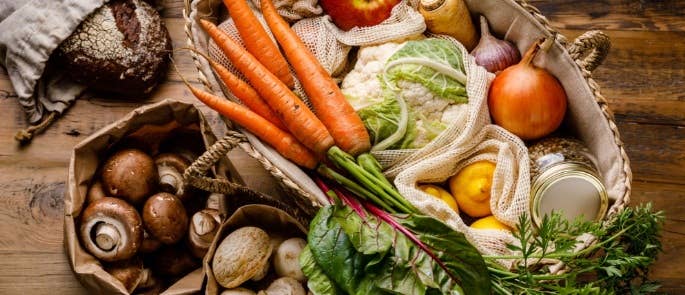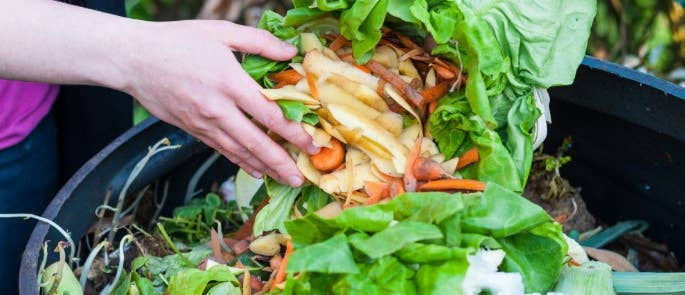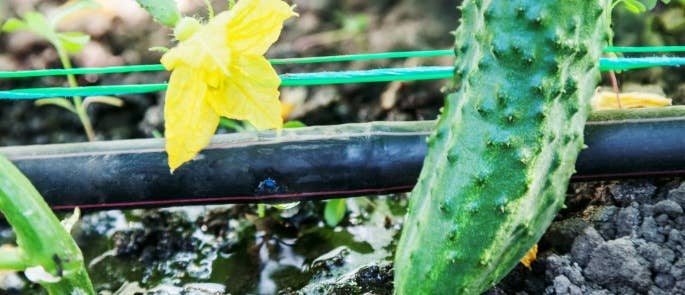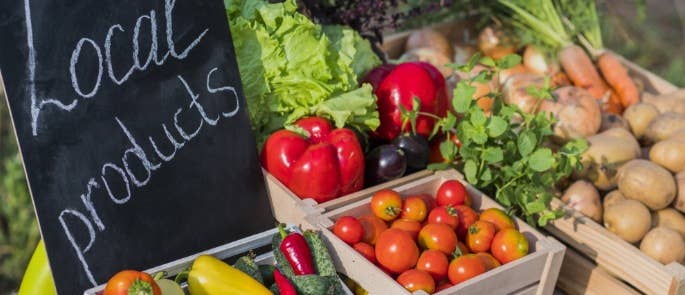Sustainable Food Practices: Choices & Importance
Sustainability – what does that mean to you? Solar panels clung to the rooftops of buildings, solemnly swearing to a life of never buying single use plastic again or vast windmill farms? All such practices are true to be sustainable, however not quite accessible to the majority of people.
Scale it back just a fraction, and begin to think of reducing your food waste, encouraging a few plant-based days a week, plot to plate and nose-to-tail eating. Taking even a few of these into consideration is a good start, next thing you know you’ll be throwing your reusable tote bag over your shoulder and annoying everyone you know with endless food sustainability trivia – embrace that inner eco-warrior!
In this article we will outline what is meant by sustainable food practices, discuss its impact on restaurants, home cooking and food shopping. We will also explain how you can best make sustainable food choices.

What are Sustainable Food Practices?
In the 21st century, sustainability generally refers to the capacity for the earth (along with all its resources) and the human race to successfully co-exist. To put it simply, sustainability means meeting our own needs without compromising the ability of future generations to meet their own needs by not diminishing the earth’s natural resources.
Food sustainability is not just about the food itself. It is a combination of factors – like how the food is produced, distributed, packaged and consumed. The term ‘food sustainability’ is one which has begun cropping up more and more in recent years. Whilst it is an important notion to consider for the planet, it is also a trend that is growing in popularity amongst home cooks, chefs and customers alike.
A few key ways that many restaurants can practice sustainable food choices are:
- Plot to plate eating, which essentially calls for as much produce as possible to be home grown and harvested.
- If home growing is not an option, many simply source produce as locally as possible.
- Incorporating lots of plant-based produce, as this often requires less energy from fossil fuels, less land and less water than meat.
- Where meat is used, sourcing it ethically and sustainably. This means ensuring a high quality of animal welfare and sustainable practices by farmers.
- Furthermore, when using meat, encourage a nose-to-tail attitude which sets out to use as much of the animal as possible, in as many ways as possible, so little goes to waste.
- Reducing food waste, by donating food which is destined to go into the bin to charities, or selling it at a discount on apps such as ‘Too Good To Go’ or ‘Olio’.
- Some fine dining restaurants also look to reduce waste by using all of their produce; where previously large quantities of vegetable peelings went in the bin to get a perfectly shaped potato.

Because of environmental concerns and societal demand, many restaurants have taken it upon themselves to source their food more locally and practice sustainability. Invariably with food trends, this then trickles down into those with home food businesses and humble home cooks – and thus, food shopping.
Sustainable Eating Habits
When exploring the notion of sustainable eating habits, we are more so thinking of smaller scale production, such as those with home food businesses, home cooks and all the food shopping they do. For home cooks sustainable food practices mean different things to that of larger scale practices, such as:
- Cooking with in season ingredients for your location, as this avoids unnecessary transportation of produce overseas – mostly in regards to fruit and vegetables.
- In line with the above, try to buy local ingredients – such as produce, meat, dairy and grains. This of course, also refers to limiting overseas transportation, but also tries to cut down on road transportation of goods.
- Make an effort to buy and cook with more plant based ingredients, and less meat and dairy products. The BBC reports that meat farming causes 60% of food-related greenhouse gas emissions worldwide.
- Try to avoid food waste as much as possible. Check out our article to find out more on how.

Sustainable Food Production
This refers to larger scale production such as restaurants and production lines in manufacturing. The changes you can make to ensure sustainable practices are:
- Conserving water – a shocking 70% of the earth’s freshwater is used for agriculture! Instead of conventional watering, drip irrigation and wastewater reuse are far more sustainable.
- Sustainable distribution can simply be done by reducing the distance your food has to travel. By aiming to supply locally or at least nationally, this cuts down on miles and thus fossil fuel consumption. If delivering locally is not possible, try to utilise greener fuels and vehicles.
- Investing in sustainable packaging. This can be anything from reusing old materials to make new packaging; or making packaging out of compostable or recyclable materials.
- Using processes which focus on waste prevention, such as reworking products which are safe for human consumption, or redirecting food that cannot be sold to charities. The food waste hierarchy is a good template of how to reduce waste going to landfill.
- Making an effort to use environmentally friendly cleaning products.
- Impose a work environment that encourages sustainability. To effectively be a part of the sustainability movement long term you should ensure your staff to also engage in it, so that the practices go beyond the four walls of your business.
- Recording the quantities of waste being produced and at which areas within the factory; so the data can be measured and analysed in order to put in procedures to reduce waste.

Waste & Resources Action Programme (WRAP) is a British registered charity that released statistics on waste. These suggested that you can save or even make money by being more sustainable. For example, £1200 is saved, on average, for every ton of waste prevented going to landfill. For every £1 invested in reducing waste, £14 is returned.
Why is Food Sustainability Important?
Partaking in sustainable food practices ensures your business or home has a low environmental impact. Sustainable food aims to avoid damaging or wasting natural resources. It minimises the contribution to climate change as it often means eating more local food which is not transported too far. Sustainable farming choices ensure a respect for biodiversity as often the smaller, more local farms grow a variety of fruit and vegetables for smaller scale consumers which, in turn, protects the biodiversity of the land and soil. It also helps to aid good employment and community support.

Both consumers and those involved in food production have roles to play in sustainable food practices. On the consumer side it’s a case of shopping and eating more consciously, disposing of as little as possible, and when doing so making sure that it is as conscious as possible. On the other side of the coin, food production lines have a larger scale responsibility with sourcing sustainable food, packaging and working methods. In a day where consumers are more eagle-eyed than ever, poor sustainability practices and values are often enough to disengage them from a brand altogether.
However, brands now know this and even though they may not engage in the most sustainable of practices, they will lure their customers into thinking they do by making misleading sustainability claims to cover up a slightly more questionable record – this is called ‘greenwashing’. Sustainability does not have legal definition, and businesses can use it freely without needing to substantiate their claims, so consumers must be wary and research behind these sweeping ‘sustainable’ claims.
How Do I Make Sustainable Food Choices?

Now it’s easy to walk away from reading this article with your reusable water bottle in hand and a mind full of sweeping statements like “I’m never eating meat again” or “I’ll only ever shop locally and in season”. We’ve all been there, that new year’s day sense of hope that anything could happen. Only, your running shoes start to gather dust and the take away menu is brought back out.
Instead, the big thing about sustainability is that it needs to be, well, sustainable. By this we mean it’s important that the changes you make are realistic and long term. This is so you can abide by them and live a sustainable life as opposed to a trendy sustainable 2 weeks. A few examples of tips to incorporate food sustainability into your life are:
- Buy local, seasonal foods – when you can. This is not to say every piece of produce you buy needs to be, but little changes like avoiding fruits such as strawberries until British summer time. Here they are grown in the UK when it is their season, so they do not need to be flown across seas.
- From a manufacturers or restaurants perspective try to source local ingredients as best you can. For example many restaurants have seasonal menus which rotate with what is available. You can find out more on restaurant sustainability here.
- Reduce food waste. This is always going to be a large topic to cover but you can reduce food waste by planning weekly meals around what you have that needs using or using up scraps in creative ways such as potato skin crisps or using the carcass from your roast chicken to make stock.
- Manufacturers should aim to use sustainable packaging and encourage recycling and freezing leftovers if possible from their customers.
- As consumers, you should make an effort to know what sustainable packaging is, and try to opt for brands that utilise that over others who do not.
We hope you found this article useful, and we hope it has instilled you with some tips and knowledge to make your life greener! As always, if you have any questions feel free to get in touch with our team. Remember to tag us on our socials with pictures of you taking our eco tips into action!
Further Resources:
- Food Hygiene Training
- How to Improve Sustainability in Restaurants
- 17 Ways to Reduce Food Waste in Your Restaurant
- Recycling in the Hospitality Industry: How & Why Should We Do it?
- What are the Different Types of Sustainable Food Packaging?







